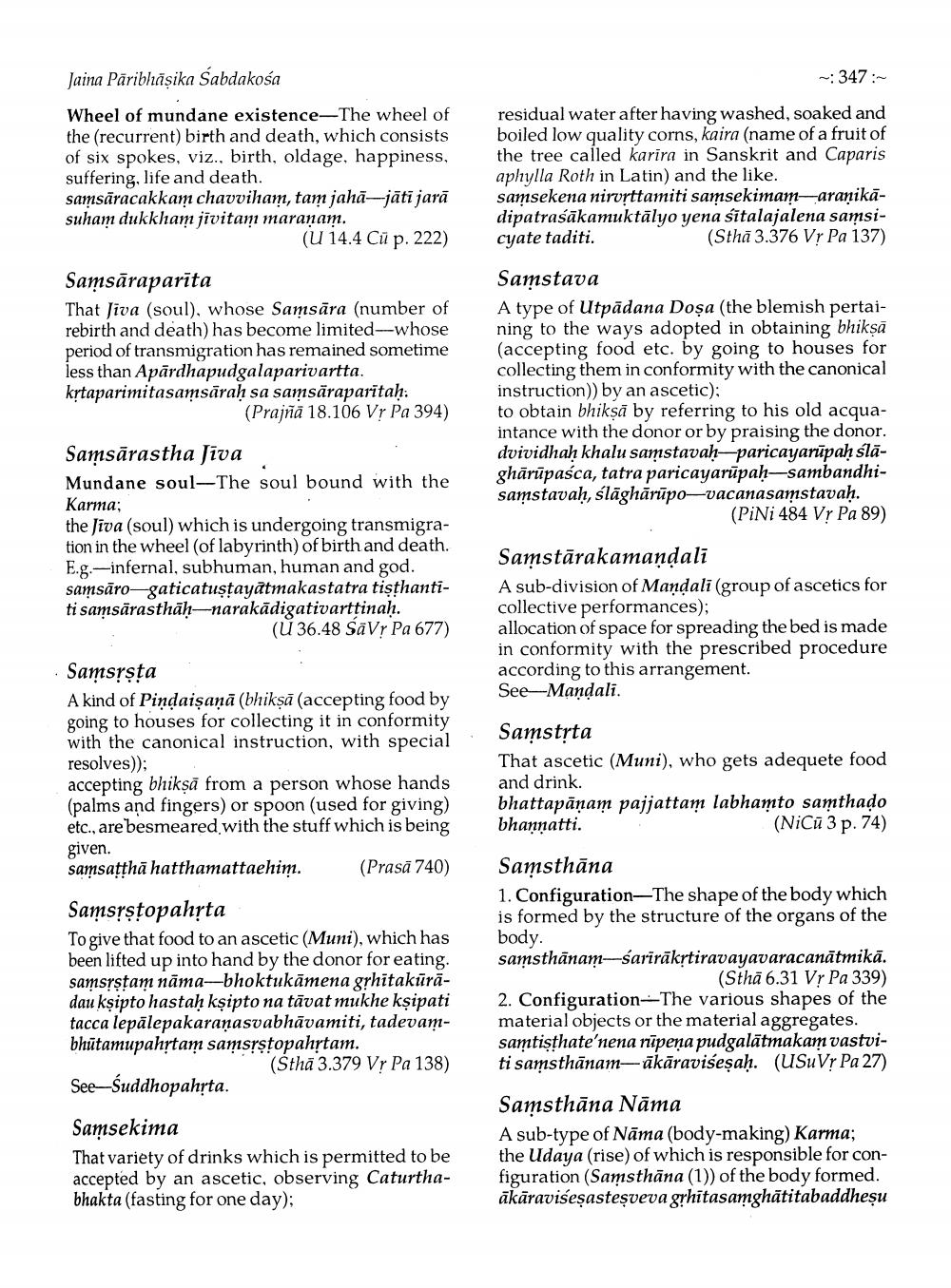________________
Jaina Pāribhāşika Sabdakosa
347 -
Wheel of mundane existence-The wheel of the (recurrent) birth and death, which consists of six spokes, viz., birth, oldage, happiness, suffering, life and death. samsāracakkam chavviham, tam jaha---jäti jarā suham dukkham jivitam maranam.
(U 14.4 Cū p. 222)
residual water after having washed, soaked and boiled low quality corns, kaira (name of a fruit of the tree called karira in Sanskrit and Caparis aphylla Roth in Latin) and the like. samsekena nirurttamiti samsekimam-aranikadipatraśākamuktālyo yena sitalajalena samsicyate taditi.
(Shã 3.376 Vr Pa 137)
Samsāraparita That Jiva (soul), whose Samsāra (number of rebirth and death) has become limited--whose period of transmigration has remained sometime less than Apārdhapudgalaparivartta. kytaparimitasamsāraḥ sa samsäraparitaḥ:
(Prajna 18.106 Vr Pa 394)
Samstava A type of Utpādana Dosa (the blemish pertaining to the ways adopted in obtaining bhikṣā (accepting food etc. by going to houses for collecting them in conformity with the canonical instruction)) by an ascetic); to obtain bhikṣā by referring to his old acquaintance with the donor or by praising the donor. dvividhah khalu samstavaḥ-paricayarūpaḥ slāghārūpasca, tatra paricayarūpaḥ-sambandhisamstavaḥ, ślāghārūpo—vacanasamstavaḥ.
(PiNi 484 V? Pa 89)
Samsārastha Jiva Mundane soul-The soul bound with the Karma; the Jiva (soul) which is undergoing transmigration in the wheel (of labyrinth) of birth and death. E.g.-infernal, subhuman, human and god. samsāro-gaticatuṣayātmakastatra tişthantiti samsārasthāh-narakādigativarttinah.
(ũ 36.48 SaV Pa 677)
Samstārakamandali A sub-division of Mandali (group of ascetics for collective performances); allocation of space for spreading the bed is made in conformity with the prescribed procedure according to this arrangement. See-Mandali.
· Samsrsta A kind of Pindaişaņā (bhikṣā (accepting food by going to houses for collecting it in conformity with the canonical instruction, with special resolves)); accepting bhikṣā from a person whose hands (palms and fingers) or spoon (used for giving) etc., are besmeared with the stuff which is being given. samsatthā hatthamattaehim. (Prasā 740)
Samstrta That ascetic (Muni), who gets adequete food and drink. bhattapāņam pajjattam labhamto samthado bhannatti.
(NiCu3 p. 74)
Samsystopahrta To give that food to an ascetic (Muni), which has been lifted up into hand by the donor for eating. samsrstam nāma-bhoktukāmena grhitakūrādau ksipto hastaḥ kṣipto na tävat mukhe kşipati tacca lepälepakaranasvabhāvamiti, tadevambhūtamupahrtam samsrstopahṛtam.
(Sthā 3.379 Vr Pa 138) See-Suddhopahrta.
Samsthāna 1. Configuration—The shape of the body which is formed by the structure of the organs of the body. samsthānam sarirākştiravayavaracanātmikā.
(Sthã 6.31 Vr Pa 339) 2. Configuration --The various shapes of the material objects or the material aggregates. samtişthate nena rūpeṇa pudgalātmakam vastviti samsthānam-ākāravićeşaḥ. (USuVy Pa 27)
Samsekima That variety of drinks which is permitted to be accepted by an ascetic, observing Caturthabhakta (fasting for one day);
Samsthāna Nāma A sub-type of Nāma (body-making) Karma; the Udaya (rise) of which is responsible for configuration (Samsthāna (1)) of the body formed. ākāraviseşasteşveva grhītasamghātitabaddhesu




